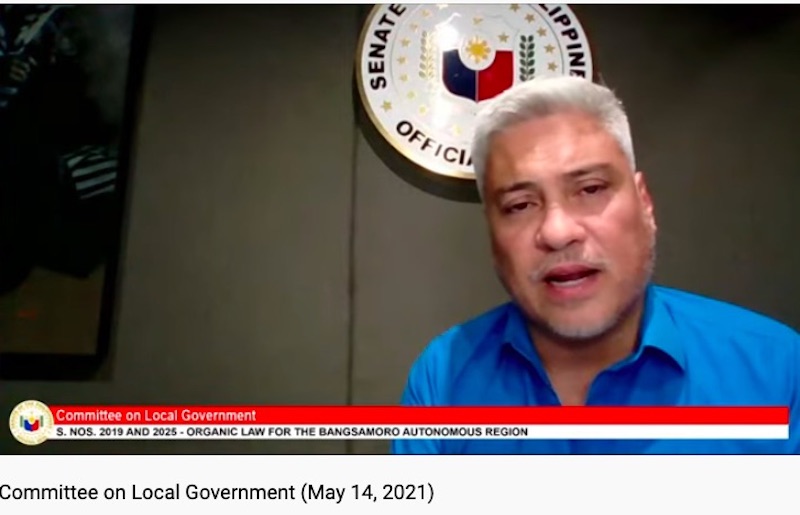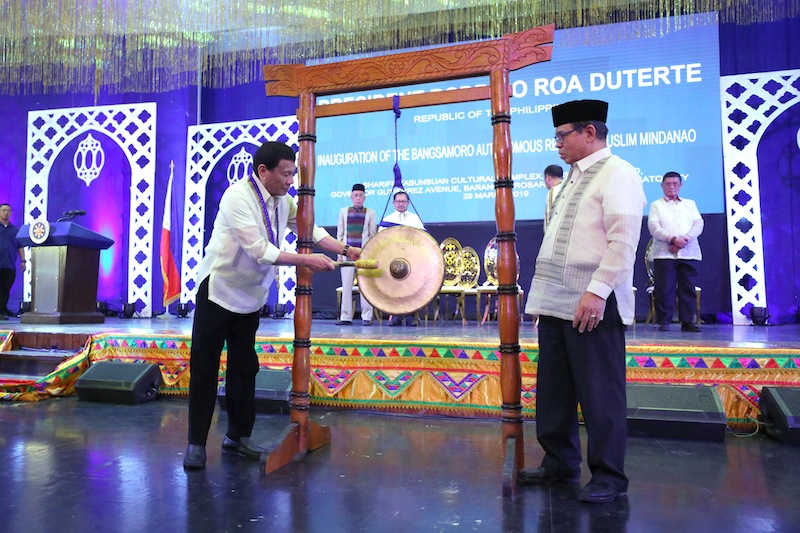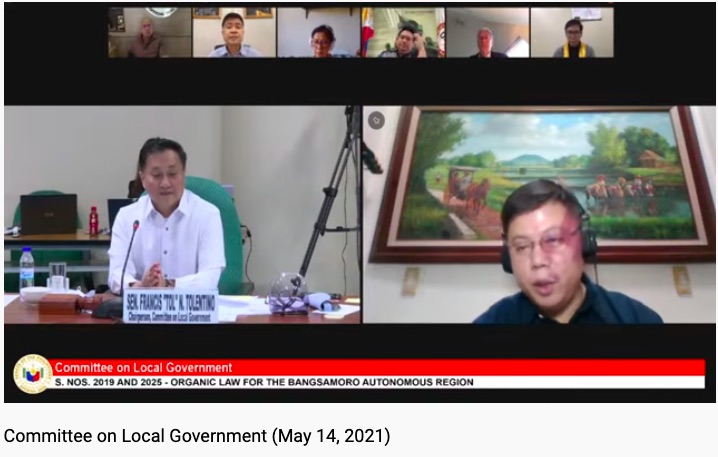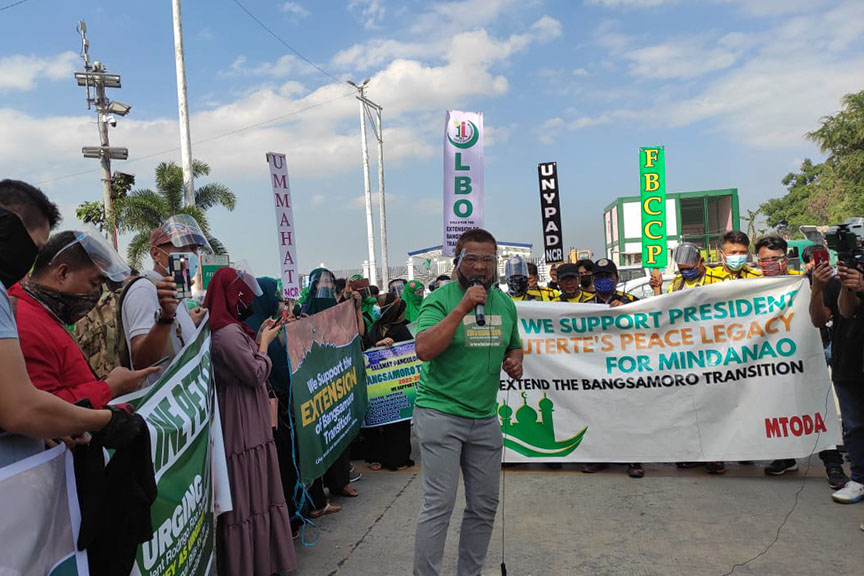DAVAO CITY (MindaNews / 16 May) – The Senate Committee on Local Government on Friday ended its hearings on the two bills seeking the extension of the transition period in the Bangsamoro Autonomous Region in Muslim Mindanao (BARMM) until June 30, 2025 instead of 2022, with Majority Leader Senator Juan Miguel Zubiri vowing that he and committee chair Francis Tolentino and other members “will make this happen.”
The Committee deliberated on Senate Bill 2019 filed by Senator Aquilino Pimenel III and SB 2025 filed by Senator Richard Gordon – both seeking to amend Section 13 of Article 16 of RA 11054 or the Organic Law for the BARMM, by resetting the date of the first election of the 80-member Bangsamoro Parliament from May 2022 to May 2025.
The resetting of the election will give three more years to the Bangsamoro Transition Authority (BTA) to finish its work. The 80-member BTA is the body tasked to govern the BARMM during the transition period that by law is supposed to end on June 30, 2022.
 Senator Juan Miguel Zubiri, Senate Majority Leader at the Senate Committee on Local Government hearing on 14 May 2021 on the proposed extension of the Bangsamoro transition period.
Senator Juan Miguel Zubiri, Senate Majority Leader at the Senate Committee on Local Government hearing on 14 May 2021 on the proposed extension of the Bangsamoro transition period.
Acknowledging the limited time left – only three weeks from May 17 when Congress resumes sessions until June 4 when it adjourns sine die – Zubiri expressed confidence during the hearing livestreamed from the Senate’s website, that the consolidated bill would be passed on second and third reading within one day, apparently confident President Rodrigo Duterte would certify the bill as urgent.
A representative of the Commission on Elections (Comelec) reiterated to the Committee their earlier request that any legislative action on the BARMM’s first parliamentary election be made “not later than July” as preparations are underway for the 2022 elections and filing of certificates of candidacy is on the first week of October.
Congress will adjourn sine die on June 4 and resume sessions on July 26 when the President delivers his sixth and last State of the Nation Address, leaving only the 27th and 28th as session days for the rest of July.
In the House of Representatives, the joint committees on Suffrage and Electoral Reforms, Muslim Affairs, and Peace, Reconciliation and Unity had earlier deliberated on five bills on the proposed extension: House Bills 8116 by Antique Rep. Loren Legarda, 8117 by Maguindanao Rep. Esmael Mangudadatu, 8161 by House Majority Leader and Leyte Rep. Ferdinand Martin Romualdez,
8222 by Lanao del Norte Rep. Mohamad Khalid Dimaporo and 8277 by Davao City Rep. Isidro Ungab.
Except for the Dimaporo bill which seeks to synchronize the first Bangsamoro Parliament election to May 2028, the rest of the bills are for May 2025.
BARMM’s and National Government’s deliverables
In his explanatory note, Pimentel said the COVID-19 pandemic “significantly affected” the BTA’s efforts, timetable to pass legislation and building of the BARMM’s institutions.
The pandemic, he added, “also apparently affected” the National Government’s fulfilment of its “remaining obligations under the normalization provisions of the Comprehensive Agreement on the Bangsamoro” that government and the Moro Islamic Liberation Front signed in March 2014 after 17 years of peace negotiations.
Pimentel said there is a “need to give the BTA and the National Government more time to completely build the BARMM and deliver each other’s commitments in relation to the peace agreement.”
 President Rodrigo Roa Duterte sounds the gong to signal the inauguration of the Bangsamoro Autonomous Region in Muslim Mindanao (BARMM) at the Shariff Kabunsuan Cultural Complex in Cotabato City on March 29, 2019, marking what he said was a “new dawn” for the Moro.’ Joining the President is BARMM interim Chief Minister Ahod Balawag Ibrahim (MILF chair Al Haj Murad Ebrahim). ROBINSON NIÑAL JR./PRESIDENTIAL PHOTO
President Rodrigo Roa Duterte sounds the gong to signal the inauguration of the Bangsamoro Autonomous Region in Muslim Mindanao (BARMM) at the Shariff Kabunsuan Cultural Complex in Cotabato City on March 29, 2019, marking what he said was a “new dawn” for the Moro.’ Joining the President is BARMM interim Chief Minister Ahod Balawag Ibrahim (MILF chair Al Haj Murad Ebrahim). ROBINSON NIÑAL JR./PRESIDENTIAL PHOTO
Gordon on the other hand said the pandemic affected government services as priorities shifted to the more compelling need to address the socio-economic crisis.. “This added a different dimension complicating the statutory timeline for the creation of a functional Bangsamoro Government,” he said.
Postponement, he said, will allow the current Bangsamoro government to “focus on providing the basic needs of its people that would help them survive the effects of the COVID-19 pandemic, at the same time … allow them sufficient opportunity to establish a formidable BARMM governmental structure and robust policies that will be vital in effectively serving the Bangsamoro people.”
Towards the end of the hearing, Zubiri moved “that we already conduct the TWG (technical working group) to draft the provisions of this measure pending before us and to already come up with committee report as soon as possible.”
Four session days a week
Zubiri reminded the body that they have only three weeks – the first week for the TWG meetings and submission of the Committee Report to the plenary – and two weeks to defend the measure on the floor.
He said there will be four session days a week (the usual is three – from Monday to Wednesday). That would then be 12 session days in three weeks instead of what would have been only nine.
Upon the approval of Zubiri’s motion, Tolentino announced that the committee is converted into a TWG and will be composed of Senator-members of the Committee on Local Government; a representative each from the BARMM, the Office of the Presidential Adviser on the Peace Process, the Department of National Defense, Comelec and the Department of Budget and Management, and two representatives from the private sector.
Tolentino said the TWG will meet next week and notices will be sent “within the first two days of the coming week.”
The two private sector representatives have not been named.
Not later than July
During the hearing, Tolentino asked the Comelec on its position on the issue.
Comelec law department director Rex Laudiangco reiterated what Comelec chair Sheriff Abas said in a meeting in Davao City that “our only position is to request that any legislative action be made not later than July because we are nearing the crux of preparations for the 2022 elections” and the filing of COCs would require “configuration of software and hardware.”
Laudiangco added that the parliamentary election is also closely tied up with the Bangsamoro Electoral Code which has yet to be passed by the BTA.
“Without the passage of a Bangsamoro Electoral Code,” Tolentino asked Laudiangco, “are we prohibited from conducting an election for BARMM next year utilizing the Omnibus Election Code?
 Senator Francis Tolentino, chair of the Senate Committee on Local Government asks Comelec Law Director Rex Laudiangco during the committee hearing on May 14 on the Omnibus Election Code in relation to the Bangsamoro Parliamentary Elections that is being sought to be reset from May 2022 to May 2025.
Senator Francis Tolentino, chair of the Senate Committee on Local Government asks Comelec Law Director Rex Laudiangco during the committee hearing on May 14 on the Omnibus Election Code in relation to the Bangsamoro Parliamentary Elections that is being sought to be reset from May 2022 to May 2025.
Laudiangco replied: “Not necessarily so worded in the law. But … we have to explain to you the quandary of the Commission on Elections. This is a parliamentary election which is not encapsulated either in the constitution, the Muslim Mindanao Act 25 , even in the Omnibus Election Code so we don’t know how and the processes by which to conduct the parliamentary election. This is new to the Comelec.”
“Because of the absence of electoral code which implies a parliamentary set up and your set up insofar as Comelec is concerned is for a republican unitary set up, your rules will not apply, is that correct?” Tolentino asked.
“In a way. We cannot depend on the existing legislation to fully conduct the parliamentary elections,” Lauadiangco responded.
Teopisto Elnas, Jr., the Comelec’s Deputy Executive Director for Operations, stressed that in case there is no Bangsamoro Electoral Code yet, “ang di lang natin pwede mai-conduct dito is the parliamentary elections but as far as the local and national elections we can still conduct the elections in the BARMM using the Omnibus Election Code.”
BARMM comprises the provinces of Basilan, Sulu, Tawi-tawi, Maguindanao and Lanao del Sur, the cities of Marawi, Lamitan and Cotabato, and the 63 villages in North Cotabato that voted for inclusion in the BARMM.
 Supporters for the extension of the Bangsamoro transition until 2025 stage a rally on 10 March 2021 outside the Senate in Pasay City where the Committee on Local Government was holding its first hearing on Senate Bills 2019 and 2025, which propose the rescheduling of the first election of the 80 members of the Bangsamoro Parliament from May 2022 to May 2025. Photo courtesy of Mindanao Peoples Caucus
Supporters for the extension of the Bangsamoro transition until 2025 stage a rally on 10 March 2021 outside the Senate in Pasay City where the Committee on Local Government was holding its first hearing on Senate Bills 2019 and 2025, which propose the rescheduling of the first election of the 80 members of the Bangsamoro Parliament from May 2022 to May 2025. Photo courtesy of Mindanao Peoples Caucus
Elnas also said that the Comelec is assisting the TWG of the BTA in crafting the Omnibus Election Code of the BARMM. The TWG sought the Comelec’s comments and recommendations especially on the creation of the Bangsamoro election office.
He said the Comelec created a body to “evaluate, assess and draft recommendation to the BTA.”
Elnas added they will submit to the BTA the recommendations, observations and comments on the draft electoral code “once approved (by the Commission) en banc,” prompting Tolentino to say “it appears now that the ball is in your court. BARMM is waiting for your output and pending that output they cannot proceed.”
“It’s already with the en banc for consideration,” Elnas replied.
“Once en banc approves, it will be referred back to the Bangsamoro Government then enacted through parliamentary measure by the BTA. So I think bilisan ‘nyo ito (you should hurry) otherwise we will just be blaming the Bangsamoro leadership for their failure to enact such Code,” Tolentino said.
Priority codes
RA 11054, the Organic Law for the BARMM, mandates the BTA to pass as priority legislation the Administrative, Education, Electoral, Local Government and Revenue codes.
The BTA passed the Administrative Code last year and the Civil Service Code.
Mohagher Iqbal, BARMM Minister of Education and head of the Moro Islamic Liberation Front’s Peace Implementing Panel, said the Education Code, which has been certified as urgent, is expected to be passed on Tuesday or Wednesday (May 18 or 19), “the Local Government Code will follow soon after Education Code” and Electoral Code has been “presented to the Cabinet and then very soon presented to the Parliament:”
He said the Revenue Code is a “very technical code and we believe it will require much consultations, hearings and engagements with experts and other resource persons.” (Carolyn O. Arguillas / MindaNews)
